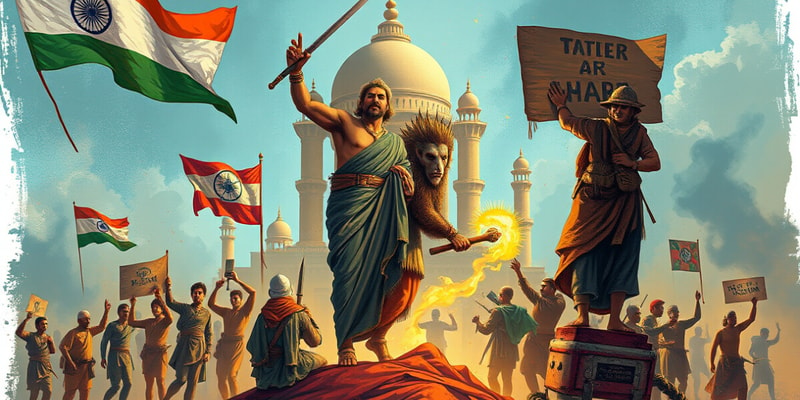Podcast
Questions and Answers
What is the primary purpose of Fundamental Rights in India?
What is the primary purpose of Fundamental Rights in India?
Which Article in the Constitution of India prohibits discrimination on grounds of religion, race, caste, sex, or place of birth?
Which Article in the Constitution of India prohibits discrimination on grounds of religion, race, caste, sex, or place of birth?
Which of the following is included under the Right to Freedom?
Which of the following is included under the Right to Freedom?
What does Article 32 of the Indian Constitution provide for citizens?
What does Article 32 of the Indian Constitution provide for citizens?
Signup and view all the answers
Which Fundamental Right prohibits human trafficking and forced labor?
Which Fundamental Right prohibits human trafficking and forced labor?
Signup and view all the answers
During which circumstance can certain Fundamental Rights be suspended?
During which circumstance can certain Fundamental Rights be suspended?
Signup and view all the answers
What is the significance of Fundamental Rights in the context of democracy in India?
What is the significance of Fundamental Rights in the context of democracy in India?
Signup and view all the answers
Which article guarantees the freedom to manage religious affairs?
Which article guarantees the freedom to manage religious affairs?
Signup and view all the answers
Study Notes
Saividhan: Fundamental Rights
-
Definition: Fundamental Rights are basic human rights guaranteed to all citizens, enshrined in Part III of the Constitution of India.
-
Purpose:
- Protect individual freedoms.
- Ensure equality and dignity.
- Safeguard against State abuses.
-
Categories of Fundamental Rights:
-
Right to Equality:
- Article 14: Equality before the law.
- Article 15: Prohibition of discrimination on grounds of religion, race, caste, sex, or place of birth.
- Article 16: Equality of opportunity in matters of public employment.
-
Right to Freedom:
- Article 19: Freedom of speech and expression; assembly; association; movement; residence; profession.
- Article 20: Protection in respect of conviction for offenses.
- Article 21: Right to life and personal liberty.
-
Right Against Exploitation:
- Article 23: Prohibition of human trafficking and forced labor.
- Article 24: Prohibition of child labor in hazardous industries.
-
Right to Freedom of Religion:
- Article 25: Freedom of conscience and free profession, practice, and propagation of religion.
- Article 26: Freedom to manage religious affairs.
- Article 27: Freedom from taxation for promotion of any religion.
-
Cultural and Educational Rights:
- Article 29: Protection of interests of minorities.
- Article 30: Right of minorities to establish and administer educational institutions.
-
Right to Constitutional Remedies:
- Article 32: Right to approach the Supreme Court for enforcement of Fundamental Rights.
-
-
Enforcement:
- Fundamental Rights can be enforced through the courts.
- Violation of these rights can lead to legal action against the State.
-
Limitations:
- Rights are not absolute; reasonable restrictions can be imposed for public order, morality, and health.
- Certain rights can be suspended during a state of emergency.
-
Impact:
- Fundamental Rights serve as a cornerstone for democracy and rule of law in India.
- They empower citizens and act as a check on governmental power.
Fundamental Rights Overview
- Fundamental Rights are essential human rights ensured for all citizens per Part III of the Constitution of India.
- They are designed to protect individual freedoms, promote equality and dignity, and prevent governmental abuses.
Categories of Fundamental Rights
-
Right to Equality:
- Article 14 guarantees equality before the law.
- Article 15 prohibits discrimination based on religion, race, caste, sex, or place of birth.
- Article 16 ensures equality of opportunity in public employment.
-
Right to Freedom:
- Article 19 encompasses freedoms of speech, assembly, association, movement, residence, and profession.
- Article 20 provides protection against retroactive laws.
- Article 21 guarantees the right to life and personal liberty.
-
Right Against Exploitation:
- Article 23 prohibits human trafficking and forced labor.
- Article 24 bans child labor in hazardous industries.
-
Right to Freedom of Religion:
- Article 25 guarantees freedom of conscience and the practice of religion.
- Article 26 allows for the management of religious affairs.
- Article 27 ensures freedom from taxation for religious promotion.
-
Cultural and Educational Rights:
- Article 29 protects the interests of minorities.
- Article 30 grants minorities the right to establish and manage educational institutions.
-
Right to Constitutional Remedies:
- Article 32 allows individuals to approach the Supreme Court for the enforcement of Fundamental Rights.
Enforcement and Limitations
- Fundamental Rights can be enforced through the judiciary, allowing citizens to seek remedy in case of violations.
- Rights are subject to reasonable restrictions for reasons related to public order, morality, and health.
- Some rights may be suspended during a state of emergency, limiting their enforcement.
Impact on Society
- Fundamental Rights are fundamental to upholding democracy and the rule of law in India.
- They empower citizens and offer a mechanism to check governmental power and actions.
Studying That Suits You
Use AI to generate personalized quizzes and flashcards to suit your learning preferences.
Description
Test your knowledge on the Fundamental Rights enshrined in the Constitution of India. This quiz covers definitions, purposes, and categories such as the Right to Equality, Right to Freedom, and Right Against Exploitation. Explore how these rights protect citizen freedoms and ensure equality.




